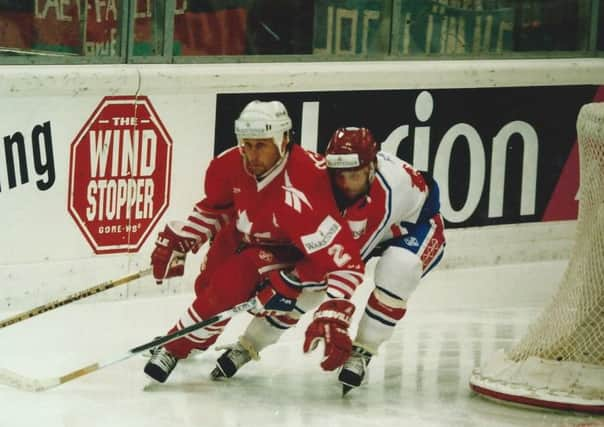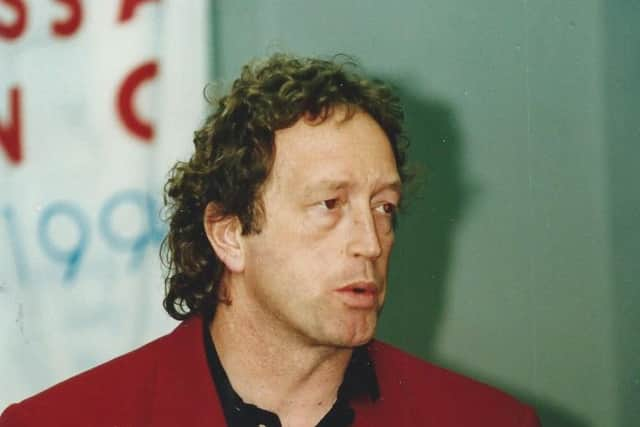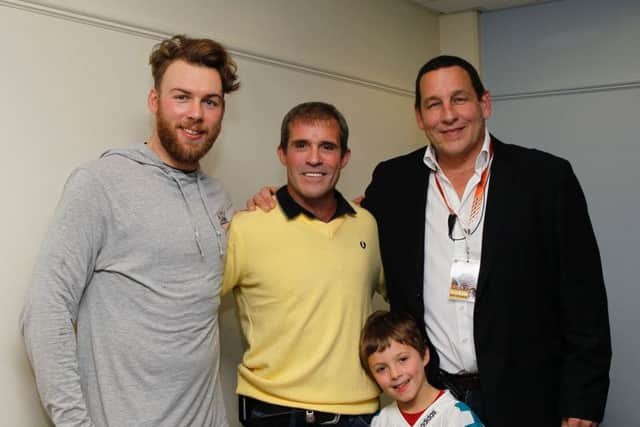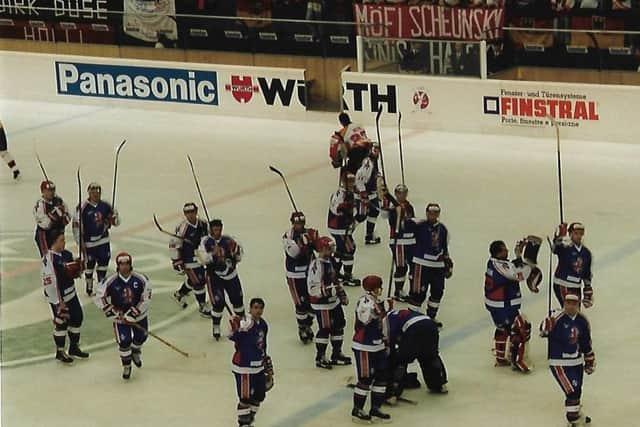Bygones – GB endure harsh lessons in unforgiving battle to hold their own among world’s elite


That doesn’t necessarily mean the challenge of taking on the likes of the 2018 Olympic silver medallists as well as heavyweights such as Canada, Finland and the USA will be significantly easier as a result but, for once, they have been given the backing so often missing in previous years.
It is all, however, a far cry from when GB was last at the elite level of the world game 25 years ago.
Advertisement
Hide AdAdvertisement
Hide AdWhile head coach Pete Russell will have had his players together for almost four weeks before their opening game in Kosice, back in 1994 his predecessor Alex Dampier barely had 24 hours to prepare his team for their opening game against Russia.
Two days before that baptism of fire in Bolzano, Italy, on April 26, 11 of Dampier’s 23-man squad had been competing at Wembley Arena in the end of season play-offs.
The team flew out on Monday and, within 24 hours of arriving at their hotel, were facing-off against the reigning world champions.
Not surprisingly, the game was effectively over as a contest by the first period break, GB trailing 6-1 with their only goal coming from Terry Kurtenbach. The following two periods were much closer, with Patrick Scott and Kevin Conway both getting on the scoresheet before three late Russian strikes saw them ease to a 12-3 triumph.
Advertisement
Hide AdAdvertisement
Hide AdIt got no easier for Dampier’s players in the coming days, with a 4-0 defeat the following day against Germany being followed by a 10-2 hammering at the hands of their Italian hosts.


An 8-2 defeat to Canada followed before a 10-0 loss at the hands of Austria left GB facing a relegation play-off decider against Norway which after 40 minutes was tied at 2-2 before their rivals pulled clear with three third period goals.
Looking back 25 years on, 68-year-old Dampier, the then head of Sheffield Steelers who had led the national team to three successive promotions to get to what was then known as Pool A, admits lack of preparation was the key to his team’s downfall.
“It was different times back then,” said Dampier from his home in Thunder Bay, Ontario. “There wasn’t a lot of time allocated to the national team as far as training and preparation goes because the league took priority.
Advertisement
Hide AdAdvertisement
Hide Ad“I was hoping we might do something against Italy and Norway, but they were too well-prepared and had enjoyed a month-long training camp prior to going. We were very disjointed and just couldn’t get things rolling.


“We took some bad lickings but the guys still showed up every night and worked real hard. A lot of guys learned from it and realised that individually they could probably play at a pretty good level. So, while in some ways it was a bit demoralising, in other ways there were some positives to take from it.”
One of the biggest criticisms at the time of the GB team was what some people regarded as an over-reliance on dual nationals, with only eight of Dampier’s squad British-trained, including emerging young forwards David Longstaff, then just 19 and called up for his first tournament for the men’s senior squad, as was 21-year-old fellow forward Nicky Chinn.
One of the dual nationals who was in Bolzano on his third tour of duty for his adopted country was veteran Canadian-born defenceman Mike O’Connor, then playing with Humberside Hawks after nine seasons with Durham Wasps and who would then go on to join the Steelers later that summer.
Advertisement
Hide AdAdvertisement
Hide AdThe 57-year-old, now working as commercial manager for the Steelers, only has fond memories of those 12 days he spent in the South Tyrol.


O’Connor had come on board with GB for the second promotion campaign under Dampier, whose team moved up to the second tier after enjoying a 100 per cent Group C1 record on home ice in Hull.
The following year, Eindhoven was home to the Group B tournament, where another clean sweep saw GB book their place at the top table.
An Olympic pre-qualification tournament held in Sheffield in August was perhaps an indication of what was to follow, though, when a series of lacklustre performances from the hosts saw their hopes of making it to Lillehammer the following year crushed as they failed to win a single game and finished bottom of the group.
Advertisement
Hide AdAdvertisement
Hide AdO’Connor admits none of the players were under any illusions as they headed out to Italy eight months later, but they were determined to relish the experiences coming their way.
“We were all at Wembley for the play-off finals on the Sunday, got issued with our blazers afterwards and then jumped on a plane to Italy the following day,” said O’Connor. “There just wasn’t the funding for a training camp or exhibition games beforehand, it’s just how it was back then.
“Alex Dampier was very good at keeping people settled. We were no different back then to how the team is today, in so much as nobody expected us to beat Canada or Russia or any of the top hockey nations. We thought we had a pretty good chance of getting a result against Norway or France, but that never happened.
“You can imagine how deep the line-ups were for the likes of Canada and Russia back then, but everybody is so deep at this level and it is the same today.
Advertisement
Hide AdAdvertisement
Hide Ad“We just couldn’t sustain that kind of speed and tempo for a 60 full minutes, but it is still an experience that I’ll never forget and it will be exactly the same for those boys who lace up their skates on Saturday to face Germany.
“I certainly wasn’t getting any younger and I was getting towards the end of my career. But I’m just thankful that I was part of that group of guys who went from Pool C to Pool A in successive years - it is a journey and experience that I’ll never forget.
The immediate return to the second tier saw the British game’s bosses have a rethink on how the GB roster was filled, with a desire to see less dual nationals involved.
It led to a number of years fluctuating between the second and third tiers before a more structured program began to take shape under Paul Thompson.
Advertisement
Hide AdAdvertisement
Hide AdAfter a near-miss at returning to the top-flight in 2011, Thompson quit, and after some tough years Tony Hand and Doug Christiansen the mantle was handed to current head coach Russell, who was appointed in time for the 2015 World Championship Division 1B campaign.
Two final day misses sowed the seeds for an eventual promotion under Russell on home ice in Belfast in 2017 before last year’s unexpected second successive gold medal in Budapest brought GB back to the top tier.
O’Connor’s son Ben has been part of the journey under Russell, having first made his senior debut back in 2008 in an Olympic qualifying campaign under Thompson.
And O’Connor Snr has passed on plenty of advice to his 30-year-old son ahead of what promises to be the most memorable few days of his hockey career.
Advertisement
Hide AdAdvertisement
Hide Ad“The teams our boys are going to be up against in Slovakia are going to have a different skill-set to what they have played against before,” said O’Connor. “The games against KHL opposition that they played recently were good preparation, as was the warm-up game against Slovakia last weekend.
“They have to be ready to play at a higher tempo every single shift and not take a single shift off. They’ve got to be engaged mentally and physically every single shift and move the puck so much quicker.
“In the Elite League you would probably have a bit more time on the puck - you just don’t get that at this level.
“You’ve got big bodies out there together with so much skill and every mistake you make, these kind of teams will capitalise on.”
Advertisement
Hide AdAdvertisement
Hide AdDespite losing 6-1 to the hosts in that final warm-up game, O’Connor saw some positives for Russell and his players to take into Saturday’s opener against Germany.
“They just have to operate at a higher tempo and they saw examples of that against Slovakia,” he added. “The boys were nervous, they wanted to play well and give a good showing but at times they gave Slovakia a little bit too much respect.
“Respect is a good thing, but they are at this tournament on merit, so they should go out all guns blazing. Yes, make sure they play a tight defensive game but don’t be scared to show their own skill-set either and take their chances when they come.
“Out of the 20 or so shots they might get in a game, they might only get three or four good looks on net, so when they get them they’ve got to take them.”